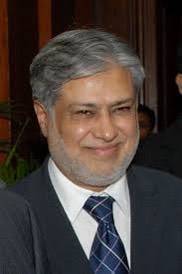Ishaq Dar vows to fix economy if provided another chance
Shares

Former Finance Minister Ishaq Dar recently expressed optimism that if his party were granted another opportunity in the upcoming General Elections, Pakistan's economy could be on the road to recovery within 3-4 years. However, Dar's track record, having held the position of finance minister four times, the most by any politician in Pakistan's 76-year history, casts a shadow of doubt on his aspirations.
Dar assumed office as finance minister on September 28, 2022. During his tenure, the Pakistani Rupee (PKR) faced significant devaluation, plummeting by Rs. 56.37 to 288.49, marking a 19.5 percent decline. Currently, the interbank PKR rate stands at 305.6 against the US dollar, reflecting a 24 percent drop from the rate of 232.12 recorded on September 28 the previous year.
Notably, Pakistan's Real Effective Exchange Rate (REER) stood at 90.9 in September 2022, but it rose slightly to 91.59 by July 2023. Despite initial optimism in the equity markets following Dar's appointment, the Pakistan Stock Exchange experienced its worst performance in six years. Key sectors such as engineering, automobile, pharmaceuticals, refinery, and cement recorded significant declines by the end of December 2022.
Dar's tenure also brought challenges for entrepreneurs and startups, with pro-IMF policies and heavy taxes deterring foreign direct investment. Funding for Pakistan's tech ecosystem declined significantly, reaching only $15.15 million in October-December 2022, marking a sharp drop from the $5.025 million recorded in January-March 2020. In January-March 2023, startup funding fell by 86.6 percent compared to the previous year.
Electricity and petroleum costs escalated during Dar's tenure. Power tariffs increased by Rs. 15.41, and taxes on commercial and domestic consumers rose by 78 percent and over 50 percent, resulting in an overall 80 percent increase in power tariffs over the past year and a half. Similarly, petroleum product rates surged, with petrol rising by 35.8 percent and high-speed diesel by 32.5 percent from September 2022 to August 2023.
The specter of default haunted much of Dar's tenure, negatively impacting Pakistan's domestic markets and dollar-denominated foreign maturities. Moody's Investors Service downgraded Pakistan's credit ratings, and Fitch Ratings followed suit with further downgrades in 2023, pushing the country deeper into the junk category.
